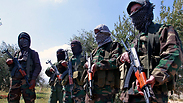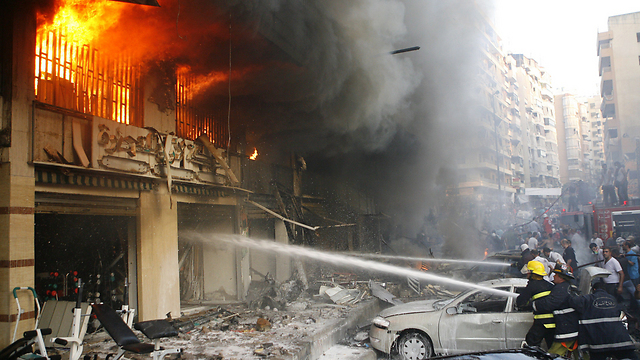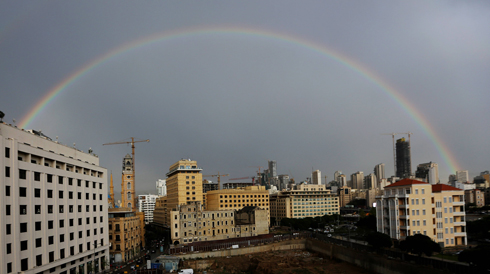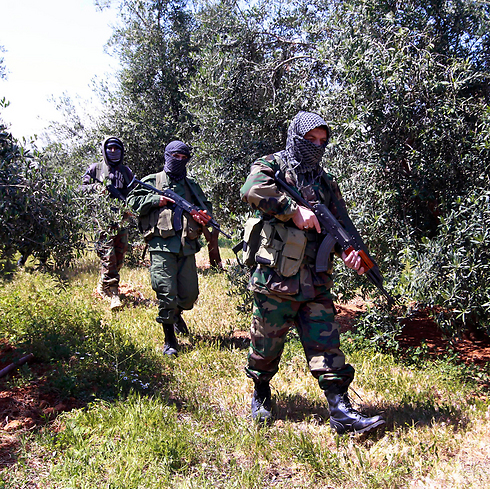
Hezbollah working with the Lebanese army leads to calm in Beirut
The flames are no longer creeping up on Nasrallah: A year after the chief of staff's prophecy that Hezbollah would come to ruin and drag Lebanon down with it, calm has been restored to Beirut. While the terror organization's budget has been significantly cut, Hezbollah continues reaping successes both in Lebanon and outside of it.
One terrorist bombing followed the next last summer in Lebanon. Car bombs exploded in Dahiya, Hezbollah took revenge with attacks of its own and IDF Chief of Staff Benny Gantz warned that "the flames have started to creep up on (Hezbollah chief) Nasrallah."
But things started to look completely different over the course of the last two months. While the Syria civil war rages on, not one terrorist attack struck inside Lebanon and rocket fire from Syrian rebels-controlled areas towards Hezbollah-controlled areas has decreased significantly.
According to Foreign Policy, the improvement in Lebanon's security situation was thanks to the formation of a new government in Beirut that was populated with members opposing Syrian President Bashar Assad, and the strengthening of security cooperation between Hezbollah and the Lebanese army.
Related stories:
- Lebanese President urges Hezbollah to leave country
- Report: Hezbollah militants killed in Israeli strike
- Fighting in Syria has changed Hezbollah's tactics
The terrorist bombings also stopped after the Syrian regime, aided by Hezbollah, regained control of the Qalamun Mountains area on the Syrian-Lebanese border, from which many attacks were launched.
"We were willing to work with anyone, with any political faction, with any person, if it meant protecting the country from terrorist attacks," a Lebanese intelligence source said. "Of course we'll do everything to stop the car bombings."
Lebanese Foreign Minister Nohad Machnouk, one of the most senior members of the Lebanese government who opposes Assad, admitted that allowing Hezbollah and the Syrian army capture the border area has contributed to the decline in terror attacks.
"What they did in Qalamun decreased the number of car bombings to a minimum, that's the truth," Machnouk said, but clarified this was not the only reason. "There was a regional decision that calm is needed in Lebanon. The message was conveyed to everyone and they acted accordingly, especially Hezbollah."
A Lebanese security source was more specific: "Hezbollah and Assad's army tried stopping the spill from Syria with force, but they failed."
According to the source, it was only when Hassan Nasrallah's organization started cooperating with Lebanese intelligence agencies, some of which are hostile to Hezbollah, that the calm returned to the country: "In a country like Lebanon, you can't ensure security using only force. You have to have political backing as well."
Lebanese newspaper An-Nahar reported Friday that security measures in Dahiya, Hezbollah's stronghold in Beirut, have been eased following the decline in terror attacks in the country in general and in Dahiya specifically. This report also attributed the drop in suicide attacks to the success of the Syrian army and Hezbollah in taking over a large area of the Syria-Lebanon border.
According to the report, the roadblocks that were put in front of the Iranian culture center in Bir Hassan - where five people were killed in a suicide attack in February - were removed. In conjunction with that, the Lebanese army has also removed some of the roadblocks at the entrance to Dahiya.
Saudi paper al-Watan quoted Western sources in Beirut as saying that Hezbollah has decreased his military activity inside Lebanon and outside of it following a budgetary dispute with its funders. According to these sources, Hezbollah is currently operating with only a quarter of the budget it received in the past. The reasons for that, the sources said, are Hezbollah's involvement in the Syria civil war, the fact that aid from the Assad regime ceased when the war in the country broke out, and the decline in Iranian involvement following the beginning of nuclear talks with the West.
Meanwhile, over a year of fighting in Syria has allowed the new generation of Hezbollah fighters to gain a lot of combat experience. The terror organization recruited a large number of fighters for the Syria war and started an accelerated training program.
A 21-year-old from Lebanon told the New York Times that he completed basic training in the Beqaa Valley in only 45 days, alongside 70 other Hezbollah recruits, many of them at the end of their 20s. Prior to joining the fighting in Syria, Hezbollah recruited mostly older men, and took years to train them.
"The younger you are, the more excited you are to join the fighting," he said.
According to him, Lebanese fighters who trained in Iran led the young recruits through the demanding physical training and shooting practice. Only half of the group went on to the next stage - an eight-month training that included anti-tank missile firing and training with other advanced weaponry.
Near this training base, he said, there was a pro-Assad base - which shows how the war fortified Hezbollah's military ties with its allies in the region.
According to a former Lebanese army senior official, hundreds of Hezbollah soldiers were killed in the fighting in Syria.
The retired Lebanese general, Hisham Jaber, said that while the large number of casualties did not significantly hurt Hezbollah's fighting abilities, it did little to justify Hezbollah’s involvement in the war to the public in Beirut.
"They can't convince me and they can't convince the Lebanese people or families of young men to go out and be killed in Aleppo or in the Qamishli area," he said, referring to areas of Syria where battles rage far away from the Lebanese border.













